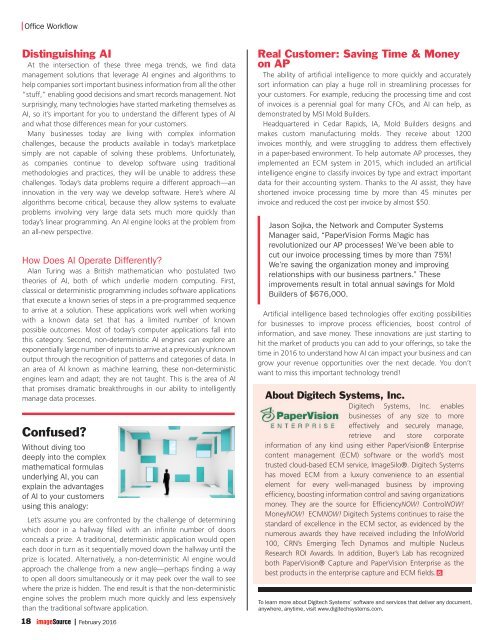Feb 2016 imageSouce Digital Edition
Create successful ePaper yourself
Turn your PDF publications into a flip-book with our unique Google optimized e-Paper software.
Office Workflow<br />
Distinguishing AI<br />
At the intersection of these three mega trends, we find data<br />
management solutions that leverage AI engines and algorithms to<br />
help companies sort important business information from all the other<br />
“stuff,” enabling good decisions and smart records management. Not<br />
surprisingly, many technologies have started marketing themselves as<br />
AI, so it’s important for you to understand the different types of AI<br />
and what those differences mean for your customers.<br />
Many businesses today are living with complex information<br />
challenges, because the products available in today’s marketplace<br />
simply are not capable of solving these problems. Unfortunately,<br />
as companies continue to develop software using traditional<br />
methodologies and practices, they will be unable to address these<br />
challenges. Today’s data problems require a different approach—an<br />
innovation in the very way we develop software. Here’s where AI<br />
algorithms become critical, because they allow systems to evaluate<br />
problems involving very large data sets much more quickly than<br />
today’s linear programming. An AI engine looks at the problem from<br />
an all-new perspective.<br />
How Does AI Operate Differently?<br />
Alan Turing was a British mathematician who postulated two<br />
theories of AI, both of which underlie modern computing. First,<br />
classical or deterministic programming includes software applications<br />
that execute a known series of steps in a pre-programmed sequence<br />
to arrive at a solution. These applications work well when working<br />
with a known data set that has a limited number of known<br />
possible outcomes. Most of today’s computer applications fall into<br />
this category. Second, non-deterministic AI engines can explore an<br />
exponentially large number of inputs to arrive at a previously unknown<br />
output through the recognition of patterns and categories of data. In<br />
an area of AI known as machine learning, these non-deterministic<br />
engines learn and adapt; they are not taught. This is the area of AI<br />
that promises dramatic breakthroughs in our ability to intelligently<br />
manage data processes.<br />
Confused?<br />
Without diving too<br />
deeply into the complex<br />
mathematical formulas<br />
underlying AI, you can<br />
explain the advantages<br />
of AI to your customers<br />
using this analogy:<br />
Let’s assume you are confronted by the challenge of determining<br />
which door in a hallway filled with an infinite number of doors<br />
conceals a prize. A traditional, deterministic application would open<br />
each door in turn as it sequentially moved down the hallway until the<br />
prize is located. Alternatively, a non-deterministic AI engine would<br />
approach the challenge from a new angle—perhaps finding a way<br />
to open all doors simultaneously or it may peek over the wall to see<br />
where the prize is hidden. The end result is that the non-deterministic<br />
engine solves the problem much more quickly and less expensively<br />
than the traditional software application.<br />
18 imageSource <strong>Feb</strong>ruary <strong>2016</strong><br />
Real Customer: Saving Time & Money<br />
on AP<br />
The ability of artificial intelligence to more quickly and accurately<br />
sort information can play a huge roll in streamlining processes for<br />
your customers. For example, reducing the processing time and cost<br />
of invoices is a perennial goal for many CFOs, and AI can help, as<br />
demonstrated by MSI Mold Builders.<br />
Headquartered in Cedar Rapids, IA, Mold Builders designs and<br />
makes custom manufacturing molds. They receive about 1200<br />
invoices monthly, and were struggling to address them effectively<br />
in a paper-based environment. To help automate AP processes, they<br />
implemented an ECM system in 2015, which included an artificial<br />
intelligence engine to classify invoices by type and extract important<br />
data for their accounting system. Thanks to the AI assist, they have<br />
shortened invoice processing time by more than 45 minutes per<br />
invoice and reduced the cost per invoice by almost $50.<br />
Jason Sojka, the Network and Computer Systems<br />
Manager said, “PaperVision Forms Magic has<br />
revolutionized our AP processes! We’ve been able to<br />
cut our invoice processing times by more than 75%!<br />
We’re saving the organization money and improving<br />
relationships with our business partners.” These<br />
improvements result in total annual savings for Mold<br />
Builders of $676,000.<br />
Artificial intelligence based technologies offer exciting possibilities<br />
for businesses to improve process efficiencies, boost control of<br />
information, and save money. These innovations are just starting to<br />
hit the market of products you can add to your offerings, so take the<br />
time in <strong>2016</strong> to understand how AI can impact your business and can<br />
grow your revenue opportunities over the next decade. You don’t<br />
want to miss this important technology trend!<br />
About Digitech Systems, Inc.<br />
Digitech Systems, Inc. enables<br />
businesses of any size to more<br />
effectively and securely manage,<br />
retrieve and store corporate<br />
information of any kind using either PaperVision® Enterprise<br />
content management (ECM) software or the world’s most<br />
trusted cloud-based ECM service, ImageSilo®. Digitech Systems<br />
has moved ECM from a luxury convenience to an essential<br />
element for every well-managed business by improving<br />
efficiency, boosting information control and saving organizations<br />
money. They are the source for EfficiencyNOW! ControlNOW!<br />
MoneyNOW! ECMNOW! Digitech Systems continues to raise the<br />
standard of excellence in the ECM sector, as evidenced by the<br />
numerous awards they have received including the InfoWorld<br />
100, CRN’s Emerging Tech Dynamos and multiple Nucleus<br />
Research ROI Awards. In addition, Buyer’s Lab has recognized<br />
both PaperVision® Capture and PaperVision Enterprise as the<br />
best products in the enterprise capture and ECM fields.<br />
To learn more about Digitech Systems’ software and services that deliver any document,<br />
anywhere, anytime, visit www.digitechsystems.com.


